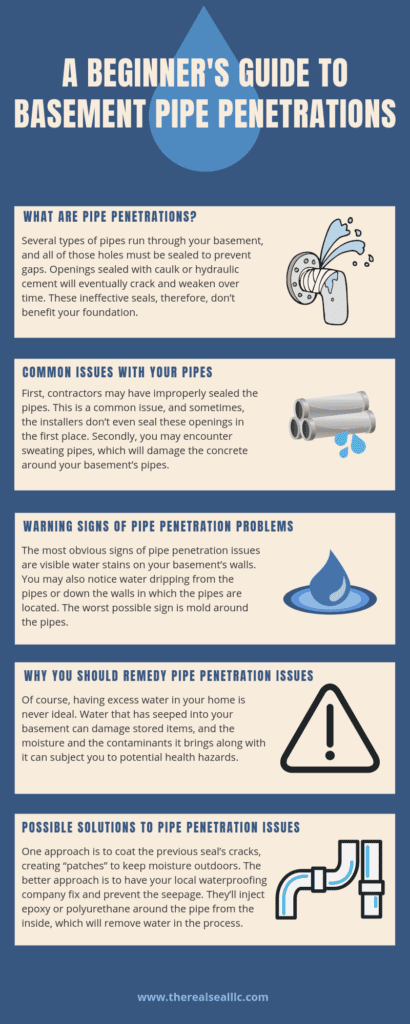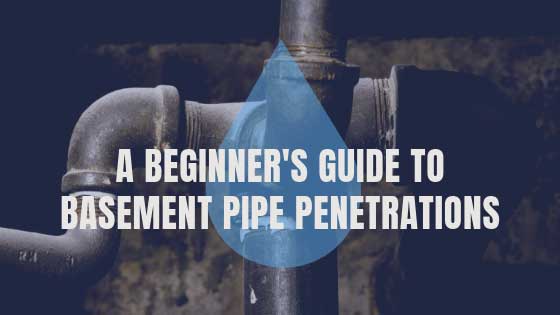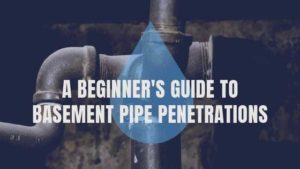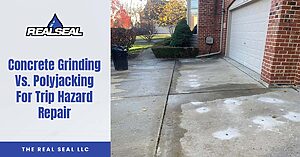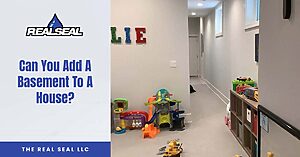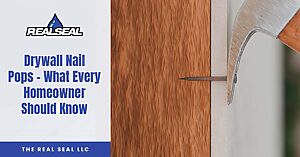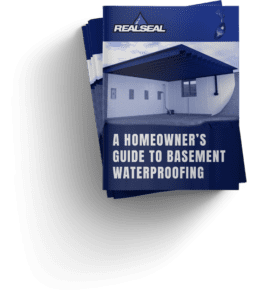There are many ways that water can enter your basement, but did you know that your pipes may not be safe from groundwater, either? Pipes can leak and cause more harm than you may think. That’s why we’ve created a comprehensive guide to basement pipe penetrations. Below, our experts provide an introduction to pipe penetrations; we also cover common pipe issues, signs that you may have problems, and how to resolve these issues.
What are Pipe Penetrations?
When companies first install the gas, electric, sewer, and water lines in your home’s foundation, they need to create holes for the pipes. Ultimately, several types of pipes run through your basement, and all of those holes must be sealed to prevent gaps. Contractors often use caulk or hydraulic cement as sealing solutions, but these materials are unfortunately only temporary fixes. Openings sealed with these materials will eventually crack and weaken over time. These ineffective seals, therefore, don’t benefit your foundation, which is designed to keep moisture out of your home—when hydrostatic pressure builds in the soil, pipe penetrations can’t hold back outside groundwater, so the water leaks around and through these openings.
Common Issues with Your Pipes
Unfortunately, you may run into some issues with your pipes. First and foremost, as we mentioned above, contractors may have improperly sealed the pipes. This is a common issue, and sometimes, the installers don’t even seal these openings in the first place. Secondly, you may encounter sweating pipes, which will damage the concrete around your basement’s pipes; the moisture can even damage your floors. Water may also leak through broken or cracked pipes, although this is seldom the case. Thankfully, these issues aren’t the end of the world—we’ll get into some solutions later in the guide.
Warning Signs of Pipe Penetration Problems
The most obvious signs of pipe penetration issues are visible water stains on your basement’s walls. These patches will look dark and damp—or, in other words, unsightly. You may also notice water dripping from the pipes or down the walls in which the pipes are located. You may even find puddles of water on the floor underneath the pipes. The worst possible sign is mold around the pipes—if you find mold, you must make plans to remove it immediately, as it can be very dangerous to your health.
As a homeowner, you should routinely inspect all the pipes in your home for these common warning signs of pipe penetration problems. Don’t forget the pipes in your basement’s ceiling, floor, and walls. You should also check these pipes after a rainfall, when you can better confirm if there’s really a major issue with the openings around your basement’s pipes—check to see if a large amount of water is entering your home.
Why You Should Remedy Pipe Penetration Issues
Of course, having excess water in your home is never ideal. Water that has seeped into your basement can damage stored items, and the moisture and the contaminants it brings along with it can subject you to potential health hazards. Although you may believe that pipe leaks can’t contribute to health-related problems, if the leaks are severe enough, they can cause symptoms such as allergies and respiratory infections. Plus, the water damage that encompasses your pipes can emit musty odors—we’re sure you don’t want this habitable space in your home to smell unpleasant. With all these factors considered, fixing the pipe-to-wall problems in your basement is essential to reducing the overall moisture in your home.
Possible Solutions to Pipe Penetration Issues
One approach to correcting pipe penetration issues is to coat the previous seal’s cracks, creating “patches” to keep moisture outdoors. You may be tempted to seal around the pipes yourself with something like cement or grout; however, this DIY method is not necessarily a permanent solution, as water can still work its way into the cracks. Furthermore, efflorescence can build behind the patch, and you’ll run into the same leaking problems time and time again.
The better approach is to have your local waterproofing company fix and prevent the seepage. Contractors can remove dirt, debris, and the previous seals from around the pipes. Then they’ll inject epoxy or polyurethane around the pipe from the inside, which will remove water in the process. Epoxy is preferred because of its strength; once cured, it can handle temperatures cooler than -20 degrees Celsius (-4 degrees Fahrenheit). Polyurethane also has a high viscosity, making it a tough material perfect for home improvement applications.
That’s why our company decided to combine both materials in our waterproofing work. After applying an epoxy bonding material, our technicians use a unique polyurethane epoxy product that, when in contact with water, expands to entirely fill any openings and hardens quickly. It then creates a watertight seal that allows for pipe movement while making it more difficult for water to enter your basement.
To correctly fix pipe penetrations and effectively stop unnecessary leaks, seeking out the professionals may be in your best interest. The pros will meticulously examine your basement’s pipes and come up with a plan to remedy the issues at hand and ultimately prevent future problems. If you live in the Chicagoland area, consider hiring The Real Seal’s licensed and insured technicians. Each of our talented team members possesses numerous years of industry knowledge, so you can trust that our basement waterproofing efforts will be successful. You can also rest assured that we’re fully equipped with the latest technology to complete exceptional work. Plus, we strive to offer personalized services to everybody we serve—we treat our customers with the utmost care, and we won’t stop until we see them smile.
Above all, there’s no denying that our experts will go above and beyond to exceed your expectations. You’re important to us, and we’ll protect your home, no matter what it takes. The Real Seal even offers a fully transferable lifetime guarantee—we know our work will last, and if it doesn’t, we’ll repair our work at no additional cost to our customers. Give us a call today to schedule your appointment.
